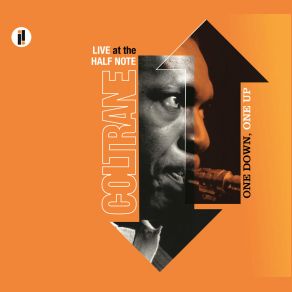One Down, One Up: Live At the Half Note
Download links and information about One Down, One Up: Live At the Half Note by John Coltrane. This album was released in 2005 and it belongs to Jazz, Avant Garde Jazz genres. It contains 8 tracks with total duration of 01:26:22 minutes.

|
|
|---|---|
| Artist: | John Coltrane |
| Release date: | 2005 |
| Genre: | Jazz, Avant Garde Jazz |
| Tracks: | 8 |
| Duration: | 01:26:22 |
| Buy it NOW at: | |
| Buy on iTunes $4.99 | |
| Buy on Amazon $9.49 | |
Tracks
[Edit]| No. | Title | Length |
|---|---|---|
| 1. | Introduction and Announcements (Live) | 1:36 |
| 2. | One Down, One Up (Live) | 27:32 |
| 3. | Announcements (Live) | 0:51 |
| 4. | Afro Blue (Live) | 12:41 |
| 5. | Introduction and Announcements (Live) | 0:43 |
| 6. | Song of Praise (Live) | 19:35 |
| 7. | Announcements (Live) | 0:43 |
| 8. | My Favorite Things (Live) | 22:41 |
Details
[Edit]Serious sax players and jazz fans have studied bootlegs of these performances since the late ‘60s. Now the rest of us can get in on the education. Culled from two 1965 appearances at New York’s Half Note club, these songs were originally recorded for a jazz radio program. The quartet regularly used this small venue (capacity 130) to stretch out in a big way, and they weren’t about to restrain themselves for the sake of a live radio audience. The producer simply rolled the tape for the 45 minutes he needed for each broadcast, then shut off the machine. As a result, the first album captures less than half of the legendary “One Down, One Up” (though over 27 minutes are included here) and “Afro-Blue” and “My Favorite Things” fade out mid-solo. No matter. Such necessary editing does not detract from the music; instead, it reinforces how fortunate we are to have access to these tapes at all.
Recorded shortly after the release of A Love Supreme and just months before the dissolution of this classic quartet, featuring pianist McCoy Tyner, bassist Jimmy Garrison, and drummer Elvin Jones, the musicians are at the apex of their incendiary four-year collaboration. For proof, listen to the interplay between Coltrane and Jones on the title track, Tyner’s solo on “Song of Praise,” and the quartet’s unrivaled fluidity and endurance throughout. Coltrane is adventurous and aggressive here, yet rooted just enough to keep from launching into the stratosphere. “Lost” recordings don’t always live up to their own mythology. These do.